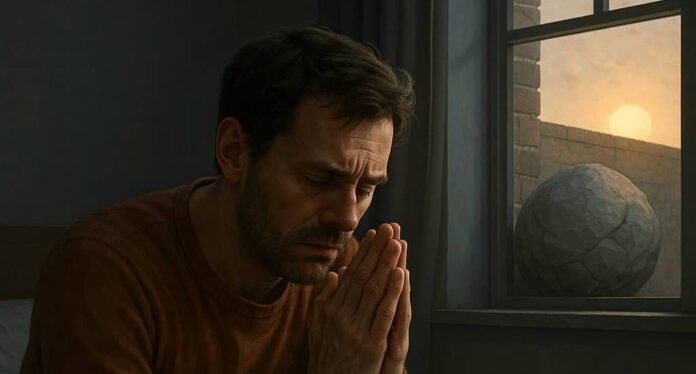By: Isaac Christopher Lubogo
There is a special kind of torment that comes not from sudden tragedy but from the monotony of unchanging burdens. To wake up every morning to the same problem is to live in what Albert Camus called the absurd—a confrontation between man’s longing for renewal and the world’s cold indifference. The absurd is not necessarily tragedy; it is the mockery of repetition. It is Job on the ash heap, asking, “Will it always be this way?”
Nietzsche would warn us here: “If you stare too long into the abyss, the abyss stares back at you.” The stubborn problem becomes the abyss. It consumes prayer, energy, and imagination, until even hope feels like a joke told too many times.
The Prayer of Futility and the Philosophy of Waiting
When one prays each night, “Lord, just this once let tomorrow be different,” they are, in truth, not only praying for change but for meaning. Kierkegaard called this the sickness unto death—the despair that arises when the self cannot reconcile what it longs for with what it actually is. Yet, the same prayer reveals faith: a stubborn clinging to the possibility of dawn, even when all previous dawns have betrayed us.
Philosophy and faith collide here. Philosophy whispers, “Problems persist because you have not transformed.” Faith replies, “Hold on, for the God of yesterday is also the God of tomorrow.” Between these two, man stands—restless, exhausted, yet still whispering a prayer into the void.
The Human Condition: Between Sisyphus and Resurrection
The stubborn problem is the stone of Sisyphus, rolled up the hill only to tumble back. Camus concluded that one must “imagine Sisyphus happy,” for the struggle itself gives shape to life. But in the African spirit, in the Christian imagination, stubborn problems are not just stones—they are tombs waiting for resurrection. The morning that looks the same is not the end; it is the prelude to the sudden eruption of the new.
The Lubogo wisdom is this: Do not measure hope by the stubbornness of the night, but by the certainty that no night has ever conquered the morning. Problems may mock your prayers, but the day you stop praying is the day the problem wins. As Mandela once said, “It always seems impossible until it is done.”
Final Word
The stubborn problem is the devil’s laughter, but your repeated prayer is the soul’s defiance. One day, whether in your lifetime or in the architecture of eternity, the morning will come when the problem finds itself defeated not because it changed—but because you outlived it.








